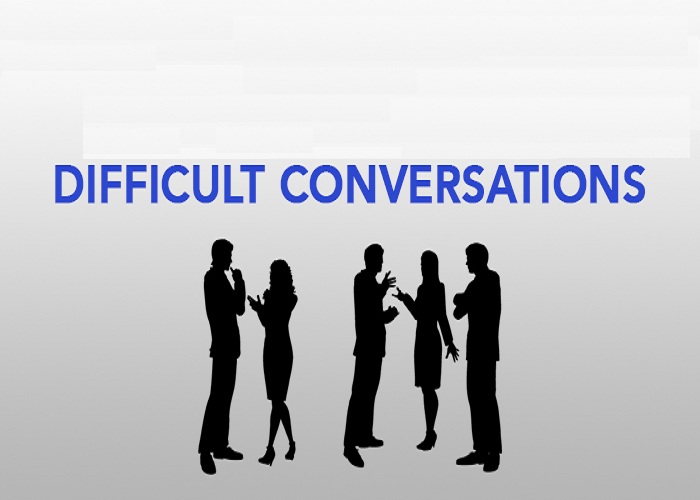




If you’ve ever had a difficult conversation, you’ll know that a natural reaction is to want to find fault in what the other person did or said. You’ll also know what it feels like when someone else apportions blame onto you for what you did or said. Finding someone to blame is a dangerous game, and in this article I’ll explain why and how to avoid it. I’ll also propose an alternative way of thinking that will reduce the emotional temperature of your conversation, make it easier for you to solve the problems created and increase your credibility in the process.
Defence is Attack in a Difficult Conversation
It’s our natural inclination, when we’re confronted with a conflict, confrontation or difficult conversation, to put the defences up and protect ourselves. Part of the process of defending ourselves is sometimes to attack the other person’s position – which leads to us attributing blame on our opponent.
The Dark Side
There’s also another reason why we get caught up in blaming others, and in the field of psychology they call it projection. If ever we feel bad, guilty or some other unpleasant feeling and maybe these feelings don’t quite sit comfortably with us or fit with our sense of identity, it’s normal for us to want to get rid of them. This phenomenon is called projection which means we project those unwanted feelings onto others, so that we get rid of them and don’t have to drag them around with us.
Case Study – That report was late and I looked stupid!’
So, imagine, you’re having a difficult conversation with a colleague who didn’t submit a project update report on time, despite your expectations that they would. You’re having to raise this issue with them in a one-to-one meeting because as a result of them not meeting your expectations, you’re made to look bad in front of your peers at your senior manager meeting. You chose not to come clean with your peers, because you were unsure of what reaction you’d get so you kept quiet and rolled your eyes as if to say ‘I know I’ll have a word with them’. You’re basically colluding and this is where the blame game begins.
Guilt, Shame and Incompetence
You’re frustrated, embarrassed and uncomfortable at having to raise the issue with your colleague. You suspect that you weren’t entirely clear or timely in expressing your expectations with them which in effect makes you complicit. But in your senior manager meeting you didn’t declare this and let the blame fall onto your colleague, and now you’re left with feelings of guilt, shame and incompetence. I’m not saying this is always true, I’m saying this is a possibility.
So, in your difficult conversation you unconsciously project these unwanted feelings onto the other person, who naturally gets defensive, because from where their sitting – you’ve contributed to the problem by not being clear or timely in your request. You’re having none of it, because by this point, you’re sucked into the vortex of the conflict and it becomes increasingly difficult and counterintuitive to backtrack and be accountable.
What are the consequences of this?
1. You lose the trust and credibility of your colleague.
2. You’re also saying that it’s OK not to be transparent and accountable and place more value on ‘saving face’ than being accountable.
3. You make a vital withdrawal from the emotional bank account.
Let’s look at the alternatives.
From Blame to Contribution
At the senior management meeting, when the problem comes up on the agenda you suggest you may have contributed to the delay in the submission of the report and will address the issue with your colleague.
What’s the worst that could happen?
I’d suggest it’s unlikely that your peers will berate you for your incompetence. I’m more inclined to think and I have evidence to support this that your peers will be thinking to themselves, ‘yes that’s frustrating, I think I’m guilty of doing that sometimes’ and ‘wow that was brave coming out and saying that in front of everyone – I respect that’.
Which one do you think is more likely?
More importantly and here’s the bigger question…
Do you care what your peers think and would you prefer to be seen as someone that acts in a way that is consistent with values of transparency and accountability.
Contribution is Accountability
How does this change your perspective on your difficult conversation?
It no longer becomes a difficult conversation, right? You sit down with your direct report to discuss the delay in the submission of your project update report. The conversation starts with you sharing how you think you may have contributed to the problem in the first place, you might also have a view that your colleague has also contributed in some way and so the two of you come up with a solution that in future improves the quality of your communication and reduces the chances of receiving delayed information in future.
You model transparency and accountability to you colleague who will, without a shred of doubt, respect you for that.
Risk and Reward
We overestimate the risk of not being transparent and accountable and underestimate the problems we create from not thinking consistent with values of transparency and accountability.
Shifting your thinking from a blame mindset to a contribution mindset is about taking accountability seriously.
Source: https://www.linkedin.com/pulse/difficult-conversations-playing-blame-game-harsh-gupta/